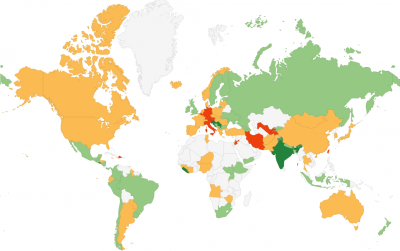Information Freedom
Information Freedom (also referred to as Freedom of Information) is a term that defines an individual’s right to access information and is largely thought of as an extension of ones right to privacy, speech and expression. Information freedom is often closely connected with digital technology and the Internet. The United States, United Nations and international community at large all consider freedom of information a basic human right.
Contents
Information Freedom in the United States
Freedom of Information Act
President Lyndon B. Johnson signed the United States Freedom of Information Act (FOIA) into law on July 4th, 1966. FIOA outlines broad information disclosure guidelines for the United States government and requires government departments and agencies to release certain information in a timely manner. Any United States citizen can request the release of any undisclosed information that the government may have. The Freedom of Information is considered a critical part of government accountability and transparency. In 2014 alone United States government received over 700,000 FIOA requests, up from 514,541 requests in 2009. There is no centralized agency that handles all requests, but instead each agency is required to process their own requests. In 2014 the Department of Justice granted the most full FIOA requests followed by the Social Security Administration and Department of Defense. The Department of Homeland Security granted the most partial FIOA request.
There are a few notable exceptions to the Freedom of Information Act. Most prominently, FIOA exempts information that contains secrets vital to national defense or foreign policy, personal or confidential information, and certain commercial information.
The Act has had several major amendments since it’s passing in 1966. In 1974 congress overrode President Gerald R. Ford’s veto of the Privacy Act that featured many amendments to FIOA. The Privacy Act of 1974 allows citizens to see all records about oneself and change them if they are inaccurate, while holding the government accountable for the records confidentially. In 1996 congress passed the Electronic Freedom of Information Act (E-FOIA), which mandated government agencies and departments to make certain records available electronically. President George W. Bush signed the OPEN Government Act in 2007 that updated FIOA and changed bureaucratic requirements surrounding the Act.
In addition to congressional amendments of FIOA, many Presidents have issued Executive Orders changing the definition and scope of the Act over the years. In the mid-1980s President Ronald Regan expanded the national security exemption to FIOA. In the 1990s President Bill Clinton took steps to nullify President Regan’s actions and expand the scope of the Act. President George W. Bush once again drastically expanded the scope of exemptions to FIOA of the September 11th Terrorism Attacks.
President Obama Administration
Global Information Freedom
Global Network Initiative
The Global Network Initiative (GNI) was launched in 2008 to protect and advance freedom of expression and privacy in the digital world. To underscore the organizations objective of protecting freedom of expression and privacy, the GNI was established on October 29th, 2008. This date marked the 60th anniversary of the signing of the Universal Declaration of Human Rights by the United Nations General Assembly. The GNI is comprised of a collection of multinational technology companies, human rights and advocacy groups, and universities. The extensive list of high-profile organizations includes Facebook, Google, Yahoo!, Microsoft, LinkedIn, Harvard University, University of California, Berkley, and Human Rights Watch.
The GNI participants are required to uphold the principals of the organization despite any pressure from national governments to do otherwise. Furthermore, participating companies are instructed to conduct human rights impact assessments before launching new products or entering new markets. Participating companies are also encouraged to communicate and collaborate with one another in order to find singular approach to the intersection of human rights and digital technology. The GNI also actively works with its participating organizations to advocate for legal change at both national and international levels. The initiative publishes annual reports assessing their progress.
